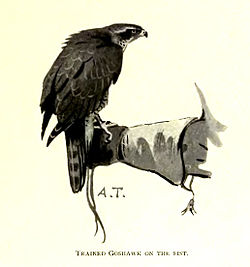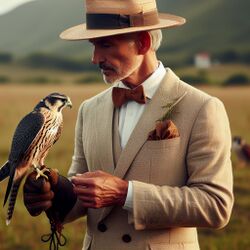Falconry: Difference between revisions
Tags: Mobile edit Mobile web edit Advanced mobile edit |
Tag: 2017 source edit |
||
| (2 intermediate revisions by one other user not shown) | |||
| Line 33: | Line 33: | ||
==Birds used in contemporary falconry== | ==Birds used in contemporary falconry== | ||
[[File:Falco cherrug Qatar.jpg|250px|right|Saker falcon in Zaclaria.]] | [[File:Falco cherrug Qatar.jpg|250px|right|Saker falcon in Zaclaria.]] | ||
*{{flag|Burgundie}}: {{wp|Merlin (bird)|Merlin}} | |||
**[[Iles Evangeline]]: {{wp|Crested honey buzzard}} | |||
*{{flag|Kiravia}}: {{wp|Peregrine falcon}} | |||
*{{flag|Yonderre}}: [[Levantine kestrel]] | *{{flag|Yonderre}}: [[Levantine kestrel]] | ||
*{{flag|Zaclaria}}: {{wp|Saker falcon}} | *{{flag|Zaclaria}}: {{wp|Saker falcon}} | ||
==Falconry culture by country== | ==Falconry culture by country== | ||
Latest revision as of 22:00, 21 August 2024
| This article is a stub. You can help IxWiki by expanding it. |
 |
Falconry (Burg: Fauconnerie, Crecerellerie (in Yonderre)) is the hunting of wild animals in their natural state and habitat by means of a trained bird of prey. It is practiced particularly widely in Burgundie, Yonderre, Zaclaria, and by the South Coscivians.
It was imported to Levantia during the Crusades in Audonia by knights from Yonderre, where it enjoys the largest following on that continent. Due to the close relationship between the countries, and it's shared cultural morays, Fauconnerie is also popular in Burgundie. The Gamehawking League of Levantia is the official body that regulates Fauconnerie as a sport in Levantia. Since hunting with firearms is heavily regulated in Burgundie, Fauconnerie is popular amongst game hunters.
Birds used in contemporary falconry

Falconry culture by country
Burgundie

Falconry in Burgundie became popular among the noble hunting parties of Maritime Dericania in the 17th century who were becoming rich after the establishment of the Burgoignesc colonial empire. This continued after the First Fratricide and the unification of Burgundie. This resulted in the dissolution of the aristocracy and as such their grand hunting estates and coincided with the late industrial revolution in Burgundie. Falconry became a rare phenomenon and was typically conducted by newly minted men of means (Burg: gens des mejans). During the First Great War, 1896-1902, the use of War pigeons was prolific, as was counter-carrier pigeon efforts. The Volonderres with falconry experience were highly sought after and they eventually became the precursor of Burgundie's counterintelligence, electronic warfare/anti-drone efforts. They would be brought in with their falcons to hunt and intercept enemy pigeons to disrupt their communications. As a result, following the First Great War, falconry enjoyed a resurgence in Burgundie. There are falconry clubs for all of the provinces in the Burgoignesc Metropole. It also enjoys a following, but not as dedicated in Torlen, and Equatorial Ostiecia. Falconry is not regulated as a form of hunting, but as a sport it falls under the auspices of the Gamehawking League of Levantia. There are 49,930 falcons registered in the Burgoignesc Metropole, the most of those are registered in provinces of Faramount and Ile Burgundie. In Equatorial Ostiecia there are 8,430 falcons registered in the Gamehawking League of Vallos, however, at this time only Burgoignesc and Kiravian possessions are a part of the League.